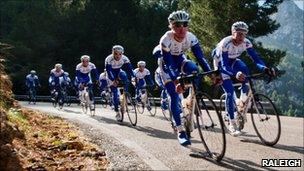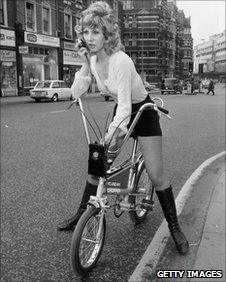Raleigh's hopes for the future
- Published

Team Raleigh riding in the hills of Majorca, in 2010
Cycling is in the midst of a boom, thanks in part to the success of the British team at the Beijing Olympics and the popularity of the Cycle to Work scheme.
And with the rise in petrol prices and the expense of running a car, there are other incentives to encourage people to turn from four wheels to two.
During the 1970s and 80s it felt like Raleigh was the only bike maker in England. All over Britain, children rode Choppers, Grifters, Budgies and Burners.
At one time, the firm was the biggest bicycle maker in the world. In its heyday, after World War II, Raleigh employed some 8,000 people.
But when Raleigh ceased production in Nottingham in 2002, the city in which it was founded, the future looked uncertain.
Famous heron
Raleigh said it had to find low-cost, reliable manufacturers outside the UK, a process which marketing manager Geoff Giddings described as a "steep learning curve".
It was also a difficult time for the 280 or so workers in Nottingham who lost their jobs.
Now, with the company a year away from its 125th anniversary, Raleigh is trying to put the famous heron emblem back in people's minds.
One of its road bikes, the Raleigh SP Race, finished fourth in Cycling Plus magazine's bike of the year awards, in March.
The award was recognition for Raleigh's improvement in its high-performance bikes.
"The family market has never really gone away," said Mr Giddings.
"It's a bit of a resurgence on the performance side for us, we dropped away from it a little."
Part of Raleigh's efforts to raise its profile have included the formation of a professional road-cycling team.
Tour de France
Since 2009, Team Raleigh has been trying to re-establish itself as a top racing force.
In the long term the team hopes to be able to compete at the Tour de France.
The last, and only, man to win the tour using a Raleigh bike was Dutch cyclist Joop Zoetemelk, in 1980, and the last time the company supported a team was over 20 years ago.

The Raleigh Chopper, invented by Alan Oakley, was a 1970s icon
"To have a Raleigh professional cycling team on the market, out there racing, then it elevates the brand in the consumers' minds," said Mr Giddings.
But can Team Raleigh reach the top?
"It's down to budget, it depends how much money they've got to spend," said Neil Pedoe, from Cycling Plus magazine.
"Last year was the first year of their comeback, with their pro-national team, which did a few international races but not with great success."
In March, Team Raleigh won a national criterium event (a race held on a 5km short course), in Shrewsbury, and a road race in Evesham Vale, Worcestershire.
But there is a long way to go.
"It's a long leap to the sort of status you need to enter the Tour de France," said Mr Pedoe.
But if Raleigh ever does achieve its long-term ambitions the words "Nottingham, England" will be sitting proudly on the head tube at the front of the bike.